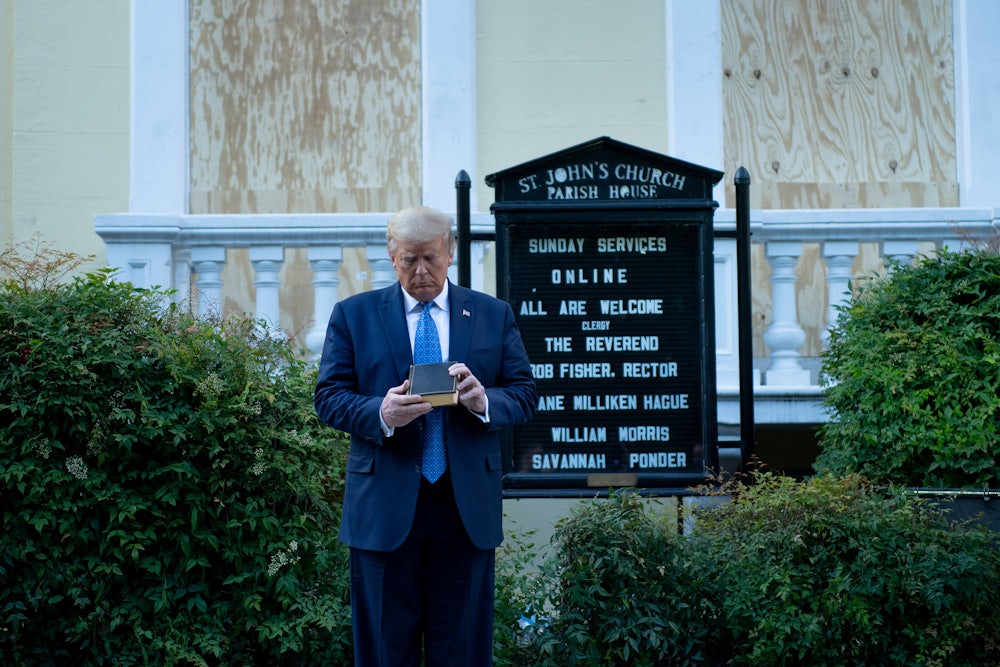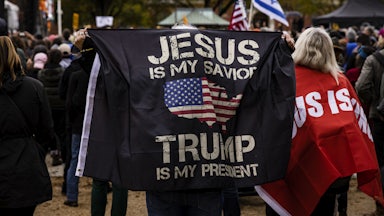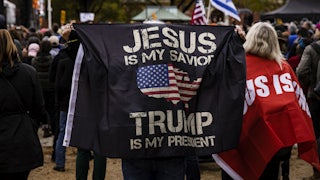If a single image could encapsulate the Trump era, perhaps it is the infamous photo of the former president standing alone on a sidewalk in front of a boarded-up church with a stern expression and a Bible in his hand. The shot was captured in June 2020, shortly after police had used tear gas to clear Black Lives Matter protestors from Lafayette Park outside the White House, where they had gathered to voice their anger about the murder of George Floyd. After the crowd was rousted, Trump marched from the West Wing to St. John’s Church for a photo op intended to cast himself as the president of law and order. With all the righteousness of a hellfire preacher, Trump boasted that America is “the greatest country in the world” and that he would “keep it nice and safe.” The enemy in his speech wasn’t a great Satan; it was ordinary citizens exercising their constitutional rights.
But there was one thing that Trump did not do that day. Surprisingly for a man standing near a church holding a Bible, he never actually prayed. Instead, once his brief remarks had concluded, he turned from the camera and walked home, the Bible with which he’d burdened himself serving merely as a prop, attesting to the president’s fervor for authoritarianism, rather than his Christian values.
This is what separates Trump from the Republicans who served before him; religious activities—such as going to church, lunching with televangelist stars, and holding prayer breakfasts for Christian lobbyists—were not a central part of his administration. Sure, he did all those things, but he did them with all the conviction of a bored teenager hauled into a pew every Sunday by his religious parents.
Remarkably, ever since Trump assumed office, the Republican Party has undergone a realignment that mirrors the former president’s own predispositions, in that it no longer strictly adheres to a religious worldview. When Trump announced his candidacy the multiply-divorced, pussy-grabbing New York businessman didn’t inspire his followers by preaching about attacks on Christianity or “traditional values,” as so many of his forebears had. Instead, he stirred fear of racial displacement and the need to preserve an “American” identity. MAGA wasn’t fighting a crusade against the godless; it was fighting wokeness. Instead of a culture war rooted in Bible verses, this new revival of right-wing ideology is now grounded in a secular struggle that no longer requires Jesus to play a role in the fight against progressive values.
One reason for this ideological shift is that Americans of both political parties are becoming less religious. A Gallup poll from March of last year revealed that 47 percent all Americans belonged to a church, synagogue, or mosque, which was down from 50 percent in 2018 and 70 percent in 1999. The decline is mostly due to an increasing number of Americans who claim no religious preference at all. The number of Americans who do not identify with any religion was 8 percent between 1998 and 2000 and grew to 21 percent by 2021. The trend can also be found within the Republican Party: Since Trump assumed office, the number of Republicans who said “to be truly American it was important to be Christian” dropped from 63 percent in 2016 to 48 percent by 2020.
Since its reincarnation after the civil rights movement, the modern Republican Party has adhered to the belief that America is a Christian nation. In 1951, William F. Buckley wrote his cri du coeur against what he perceived to be an oppressive academic establishment that stifled individualism. In God and Man at Yale, Buckley wrote, “I myself believe that the duel between Christianity and atheism is the most important in the world. I further believe that the struggle between individualism and collectivism is the same struggle reproduced on another level.”
The synthesis of Christian moral values and conservative beliefs continued throughout the rest of the century. Senator Joseph McCarthy’s anti-communist witch hunts were pitched to the American people as a war against godless socialist usurpers. During the 1970s, when Republicans were busy fighting affirmative action and public school busing, they also rode a wave of born-again Christianity that propelled evangelical preachers like Jerry Falwell into the national spotlight. Sunday sermons in newly built megachurches sounded very similar the rants heard on right-wing talk radio.
What has emerged over the last decade is what sociologist Donald Warren described in the 1970s as the rise of Middle American Radicals, or MARs. These voters are not necessarily the same who still attend church services. Their most distinguishing feature is that most of them are white middle to low-income earners without a four-year college degree who share a suspicion of big government and a fear that the middle class is under attack. They are the voters most likely to tune into Tucker Carlson ranting about immigrant Spanish speakers taking over small towns and liberals attempting to take guns from responsible owners. They are also the ones most likely to self-identify as “anti-woke.”
Nowhere is the anti-woke fervor more apparent than in Ron DeSantis’s Florida. In his first term in office, he went so far as to label a bill that seeks to restrict public school children from learning about America’s racist legacy as the Stop WOKE Act. In a separate measure, MARs voters did not vocalize their support for the governor’s Don’t Say Gay bill in religious terms. Instead, most of these new right-wing voters excused their homophobia as a thinly veiled loathing against a “woke agenda” that would force them to call somebody using their preferred pronouns.
None of this is to say that the Republican Party no longer enjoys the support of what was once described as the moral majority. White evangelical protestants who regularly attend church services overwhelmingly voted for Trump in 2020. Recent Supreme Court cases overruling abortion and enshrining prayer in school gave a nod to old-school conservatism with Christianity at its core. When these high court decisions were announced, secular Republicans rejoiced alongside their more religious counterparts. The Christians claimed to celebrate the rulings because they placed God back in the center of American life. The nonreligious right-wingers were happy because it reaffirmed their anti-woke authority over women’s bodies and stuck it to the liberals.
In his victory speech this past November, Ron DeSantis claimed that new arrivals in the state were fleeing to “the promised land of Florida” because liberal cities were overrun by “medical authoritarianism” and high taxation. To his crowd of followers, he preached: “We fight the woke in the legislature. We fight the woke in the schools. We fight the woke in the corporations. We will never, ever surrender to the woke mob. Florida is where woke goes to die.” In his speech he mentioned God twice. He mentioned wokeness seven times.
What this decoupling of religion and ideology reveals is that for many Republicans, a professed love for the teachings of Jesus were never about love and charity, but about the maintenance of antisocial ideals: Dominion over the rights of others and the preservation of a social hierarchy pitting the preferred in-group against all disfavored out-groups. The United States of America may have been founded on puritanical values, but it now appears that those same values can persist and evolve even without the Puritans.










